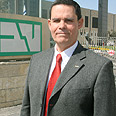
Teva sets R&D layoffs in sights
Two months after announcing acquisition of US-based Cephalon, drug maker's personnel expected to pay price. Teva informs its branded products senior management that they won't remain with company. Cephalon may become branded products division, activity may be relocated from Israel to US. Teva: Various alternatives weighed
In a move initiated a year ago, Teva Pharmaceutical Industries announced organizational changes and the parachuting of directorate member Professor Yitzhak Peterburg into the position of VP Global Branded Products – Teva's proprietary research and development products division.
Last weekend, Cephalon's shareholders and directorate approved the company's acquisition by Teva and estimates on the market were that Teva will incorporate Cephalon into its Israel division headed by Peterburg; however, it seems that Teva changed its course and it is once again changing its organizational structure.
Calcalist has learned that Teva is mulling turning Cephalon into its branded products arm, relocating the division's activity from Israel to the US. As part of the move, Professor Peterburg might leave his current position and the company is examining his reassignment to another position in the company.
Preparatory talks
Teva has put the reorganization scheme in motion and last Thursday several senior research and development managers were already summoned to talks in which they were informed that they will no longer stay with the company once the merger comes into effect. At that, US senior VP R&D Rivka Kreitman will be replaced with a Cephalon representative.
Teva Pharmaceuticals' R&D division has some 2,700 employees, 1,000 of which are in Israel. The division develops generic and proprietary – innovative – drugs, with an annual budget of approximately one billion dollars. The upcoming merger is expected to impact the company’s personnel that develops proprietary drugs, most of which are based in Israel, as of 2010.
Since the bulk of Teva's planned proprietary drugs is predominantly based on Cephalon's and as Teva's US R&D division will be headed by one of Cephalon's execs, most of Teva's R&D efforts will be channeled to the States, meaning that this time, Teva's employees are the ones who will lose their jobs as oppose to former mergers in which the target company's personnel wee the ones to get axed.
It seems that senior R&D management are riled up as they have not yet been informed of their new positions in the consolidated company – several even estimate that the company will let them go, followed by layoffs of many employees of the company's Israel Innovative R&D division.
Senior execs concerned over relocation
In recent years, Teva abstained from mass R&D layoffs, instead reassigning unsuitable employees to other positions within the company. For the time being, news of Teva's reorganization has not yet permeated to middle management and concerns over layoffs and uncertainty about the future remain the lot of the senior management.
R&D heads noted that the company assured them that the new R&D division will not be based exclusively on Cephalon personnel but on top employees from both companies, in what the managers view as an attempt to assuage their concerns over the termination of the Israel-based innovate R&D activity and its relocation to the US under Bill Marth. Despite these massages, managers who were presented with the company's reorganization scheme are worried about their future with the company or a possible relocation.
Preparing for day after Copaxone
Underpinning the acquisition of Cephalon is Teva's effort to wean the company of Copaxone – its proprietary MS drug and the company's golden egg which according to estimates rakes in half of the company's annual profits. As oppose to previous acquisitions from similar fields, Cephalon paves the way for Teva into new realms of pharmaceutical activity.
Cephalon develops central nervous system disorders, cancer and pain treatments. It also has a Swiss-based generic arm – Mepha and holds strategic investments in Australian pharmaceutical firm Mesoblast.
Aside from diversifying the company's drug portfolio, President and CEO Shlomo Yanai is banking on a synergy similar the one with German Ratiopharm from 2010.
Teva hopes to cut over $500 million in company costs within the first three years of the merger. The Teva-Cephalon merger qualifies for Teva's prerequisite that the acquired company produce value for its shareholders within the first year of the merger.
Teva: No final decisions made
Following the acquisition, Teva's leverage is expected to increase by 34% against the projected 24% estimated at the time the merger was announced.
On the road to the acquisition of Cephalon, Teva announced last month the conclusion of its three-year $4 billion credit agreement – the largest line of credit granted to an Israeli company to date – with a local and foreign bank syndicate headed by HSBC and including Citigroup, Barclays Capital, BNP Paribas, Credit Suisse, Goldman Sachs, Morgan Stanley and J.P. Morgan. The financing agreement will include among others Bank Hapoalim and Bank Leumi.
Teva said in response, "The planning of the integration between the two companies is still at its preliminary stage and no final decisions were made yet as regards the structure, location and/or assignment of company personnel.
"Like with any other planning activities, various alternatives are being weighed, therefore, this article is based on speculative information."
- Follow Ynetnews on Facebook















